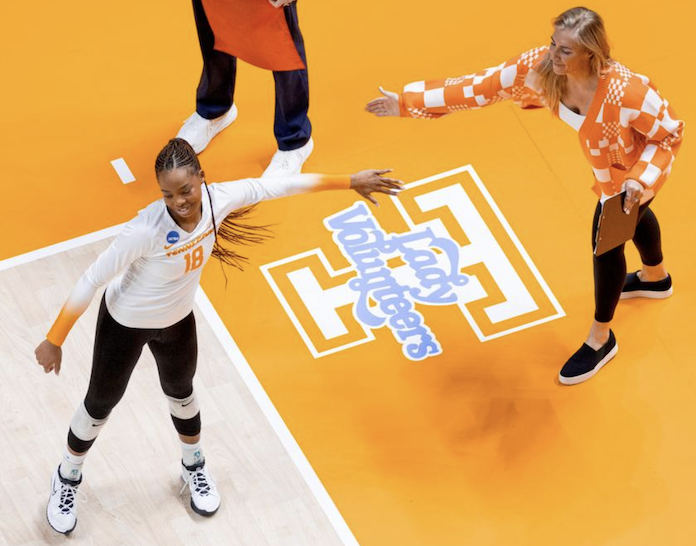
NCAA volleyball round of 16 begins: Schedule, women coaches, key transfers
Eve Rackham Watt and Jenaisya Moore in Tennessee’s win over Western Kentucky/Andrew Ferguson, Tennessee Athletics
Will there be a new champion for the third time in four years?
History indicates otherwise as the NCAA Division I women’s volleyball tournament heads into Thursday’s round of 16.
Just 12 programs have won the national championship since 1981, the year the NCAA conducted its first tournament. USC won that first title, the same year Texas won the last AIAW national championship.
Since then, USC won two more, in 2002 and 2003, and Texas has won the NCAA title three times, in 1988, 2012 and last year.
When Kentucky won in 2020 (spring 2021), the Wildcats became the first first-time champion since Washington in 2005. Wisconsin became a first-time winner in 2021.
Thursday’s round of 16
Here is Thursday’s schedule, in chronological order, with all times Eastern:
No. 5 Louisville (26-4) vs. No. 12 Creighton (29-4), noon, ESPN2
No. 1 Nebraska (30-1) vs. Georgia Tech (24-6), 2 p.m., ESPN2
No. 4 Pittsburgh (27-4) vs. No. 13 Washington State (26-7), 2:30 p.m., ESPNU
No. 8 Kentucky (21-7) vs. No. 9 Arkansas (27-5), 4:30 p.m., ESPNU
No. 3 Wisconsin (28-3) vs. Penn State (23-8), 7 p.m., ESPN2
No. 7 Texas (24-4) vs. No. 10 Tennessee (26-4), 9 p.m., ESPN2
No. 6 Oregon (28-5) vs. No. 11 Purdue (23-8), 9:30 p.m., ESPNU
No. 2 Stanford (28-3) vs. Arizona State (28-6), 11:30 p.m., ESPNU
Women coaches
Six of the final 16 teams are coached by women, but in at least one regional only one of three can emerge. At Pittsburgh, Louisville (Dani Busboom Kelly) plays Creighton (Kirsten Bernthal Booth) and Washington State (Jen Greeny) plays Pitt.
At Nebraska, Georgia Tech’s Michelle Collier is the lone women coach as her team plays the Huskers and Kentucky plays Arkansas.
It’s the same at Wisconsin, where Katie Schumacher Cawley’s Penn State team plays the Badgers and Oregon plays Purdue.
And at Stanford, Eve Rackham Watt and Tennessee play Texas and Stanford plays Arizona State.
No women has coached an NCAA winner.
Texas-Arlington broke throughto the national semifinals in 1989 under Cathy George.
BYU been to the national semifinals under Elaine Michaelis (1993) and Heather Olmstead (2018).
Florida, under Mary Wise, has been to the national semifinals eight times (1992, 1993, 1996, 1997, 1998, 2002, 2003, 2017), losing in the 2003 title match to USC in the 2017 final to Nebraska.
Louisville’s Kelly took the Cardinals to the 2021 national semifinals and to last year’s final against Texas.
Merritt Beason leads Nebraska in kills/Nebraska photo
Tons of transfers
While acknowledging that the rich always get richer and that the top teams would get this far regardless, but transfers have had a tremendous impact on this round of 16. Many of the top attackers are transfers. Here is a list, not meant to include everyone, of significant players on their respective second teams in order of seeds:
Nebraska — Merritt Beason, who left Florida after last season, leads the Huskers with 414 kills, 63 more than her closest teammate.
Wisconsin — Sarah Franklin, in her second year with the Badgers after leaving Michigan State, is the Big Ten player of the year. She has 438 kills, 182 more than her closest teammate. Temi Thomas-Ailara, who transferred from Northwestern, is fourth in kills and Carter Booth, who came from Minnesota, is fifth in kills and leads Wisconsin in blocks.
Pittsburgh — Emma Monks, who leads the Panthers with blocks, 44 more than her next closest teammate, transferred from Michigan State.
Louisville — Charitie Luper, who left UCLA after last season, is second in kills and third in digs.
Oregon — Gabby Gonzales, who left Ohio State after last season, is second in kills and third in digs; Kara McGhee, who left Baylor after last season, leads in blocks and is fourth in kills; and setter Hannah Pukis started her career at Washington State, is in her second year at Oregon, and is second this season in the Pac-12 in assists per set. Gonzales, McGhee and Pukis are all on the all-Pac-12 team.
Texas — Perhaps most notable among transfers is Madisen Skinner, who won a national title with Kentucky as a freshman and is in her second year at Texas, where she won it all again last year. She’s the Big 12 player of the year and has 463 kills, 86 more than Jenna Wenaas, a first-year transfer from Minnesota. Bella Bergmark, in her second year with Texas after starting her career at Cal, is second to Asjia O’Neal in blocks. Nebraska transfer Keonilei Akana served the ace that gave the Longhorns the national title a year ago and is third in aces for Texas this season and fifth in digs.
Arkansas — Sania Petties, who transferred after last season from Mississippi State, is second in blocks and fourth in kills.
Tennessee — Jenaisya Moore, who left Ohio State after last season, is second in kills, Erykah Lovett, in her second year with the Vols afer leaving Long Beach State, is third in kills. Raeven Chase was ineligible the first half of the season after transferring from Eastern Michigan and still is second in blocks.
Washington State — Iman Isanovic left Arizona State, where she led the Sun Devils in kills last sesaon, and is second in kills this season for Washington State.
Georgia Tech — Tamara Otene, who leads the Yellow Jackets in kills, played her first two seasons at Illinois State. This is her second year at GT, where she was third in kills last year. DeAndra Pierce, who started at Texas, leads GT in blocks and is fourth in kills. Liv Mogridge, who transferred from North Carolina after last season, is second in blocks.
Penn State — The Nittany Lions are loaded with transfers. Setter Mac Podraza, who transferred after a four-year, All-American career at Ohio State, and leading attacker Jess Mruzik, who is in her second year after transferring from Michigan, both made the all-Big Ten team. Mruzik has 504 kills, 188 more than her next closest teammate, Camryn Hannah, a first-year transfer from Clemson. Taylor Trammel, in her second year after transferring from Purdue, is second in blocks and third in kills. Zoe Weatherington, who started at Utah and is in her second year at Penn State, is fourth in kills and fourth in blocks.
Arizona State — There are eight Sun Devils who started elsewhere, including leading blocker Claire Jeter. She is in her third season at ASU after starting at Texas A&M. Second-leading blocker Maddie McLaughlin started at SUNY Geneseo and is in fourth year at ASU. Mary Shroll, who leads in digs, is in her second season after transferring from Loyola Marymount.
Saturday’s regional finals
The four regional finals will be shown on ESPNU, all in a row, starting with the Pittsburgh regional at 4 p.m.. Then comes the Nebraska regional at 6 p.m., the Wisconsin regional at 8 p.m. and Stanford regional at 10 p.m.
There is no way, of course, that matches will finish in less than the two hours alloted — one can only wonder why the matches couldn’t start a few hours earlier to avoid overlap — so be prepared to have a second TV/device handy to watch on an alternative ESPN network and/or an ESPN streaming outlet.
History
Texas swept Louisville for the 2022 national title, its first since 2012. In the semifinals, Texas defeated San Diego, which was making its first national semifinals appearance, and Louisville beat Pittsburgh in five as two ACC teams made their second and back-to-back final-four appearances.
Just 12 programs have won since the NCAA began holding women’s volleyball championships in 1981: Stanford (9 times), Penn State (7), Nebraska (5), UCLA (4), Hawai’i (3), Long Beach State (3), USC (3), Texas (3), Pacific (2), Kentucky (1), Wisconsin (1) and Washington (1).
Kentucky of the SEC was the only team outside of the Big Ten or Pac-12 to win the crown since Texas of the Big 12 won in 2012 when it won in the spring of 2021.
The post NCAA volleyball round of 16 begins: Schedule, women coaches, key transfers appeared first on Volleyballmag.com.
Read More Volleyballmag.com NCAA Women


